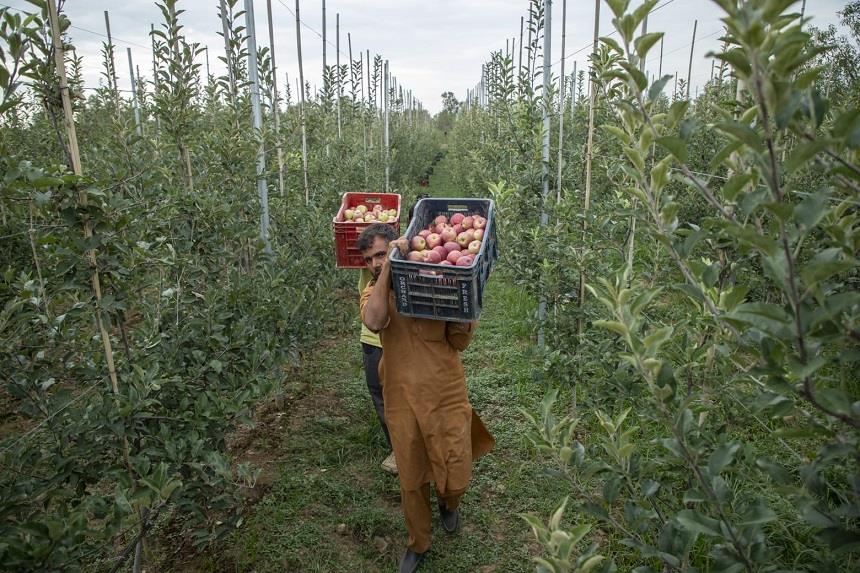
High-Density Apple Prices Dip From Rs 150 To Rs 70 Per Kg
Scores of farmers across the valley are finding new hope in high-density apple farming, which was introduced in Kashmir around 2015. Unlike traditional apple trees that take nearly a decade to bear fruit, high-density plants begin producing within a year and reach full production by the fourth or fifth year.
“These apples are harvested in August, much before the snowfall season, so we don't suffer losses like in traditional varieties that are harvested till November,” Mohammad Ashraf, a grower from Pulwama said, as per news agency KNO.
Ashraf revealed that he replaced his old orchard with Red Galla high-density apples last year.“This year, I earned nearly 12 lakh from just eight kanals of orchard. For 15 years, my traditional trees never gave me such returns,” he said.
Farmers say the yield of high-density apples is nearly three times greater than traditional varieties, with up to 80 per cent lower consumption of fertilisers and pesticides.“I invested around Rs 2 lakh in planting high-density apples last year. Within a year, I have already recovered more than half of it,” said Mohammad Ayoub, a farmer from Anantnag.
Read Also Video: Trump Tariffs Prompt Retaliation Call From Kashmir Apple Growers Trump Tariffs Prompt Retaliation Call From Kashmir Apple GrowersAccording to growers, demand remains strong despite the fall in market price. Many customers are even reaching orchards directly to purchase the produce.“Even at Rs 70 per kilogram, the returns are better than what we got from traditional apples,” said another grower.
Experts attribute the success of high-density farming to its efficiency and environmental benefits.“Traditional orchards waste huge quantities of fertiliser and sprays due to tree height, which also leads to soil degradation and pollution,” explained Ansar- Haq, a manager of a company supplying high-density apple plants.
“High-density orchards consume 70 per cent less fertiliser and 80 per cent less pesticide sprays while producing 50 to 70 tonnes of fruit per hectare by the third year, compared to just 10 to 15 tonnes from traditional orchards,” Haq added.
Farmers and experts believe that the model not only ensures higher income but also provides a sustainable future for apple cultivation in Kashmir.

Legal Disclaimer:
MENAFN provides the
information “as is” without warranty of any kind. We do not accept
any responsibility or liability for the accuracy, content, images,
videos, licenses, completeness, legality, or reliability of the information
contained in this article. If you have any complaints or copyright
issues related to this article, kindly contact the provider above.
Most popular stories
Market Research

- Thinkmarkets Adds Synthetic Indices To Its Product Offering
- T-REX Launches Intelligence Layer To Fix Web3's Value Distribution Problem
- BTCC Exchange Maintains 143% Total Reserve Ratio In September 2025 Demonstrating Continued Financial Strength
- Ethereum-Based Defi Crypto Mutuum Finance (MUTM) Raises Over $16 Million With More Than 720M Tokens Sold
- Superiorstar Prosperity Group Russell Hawthorne Highlights New Machine Learning Risk Framework
- R0AR Chain Announces $100,000 Community Rewards For Creators, Yappers, And Brand Evangelists



















Comments
No comment